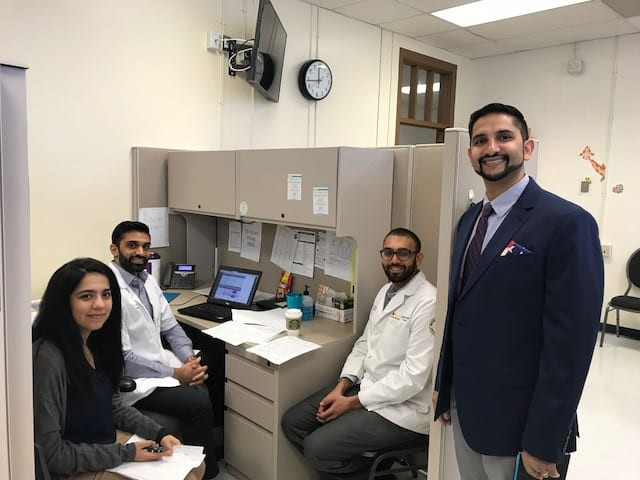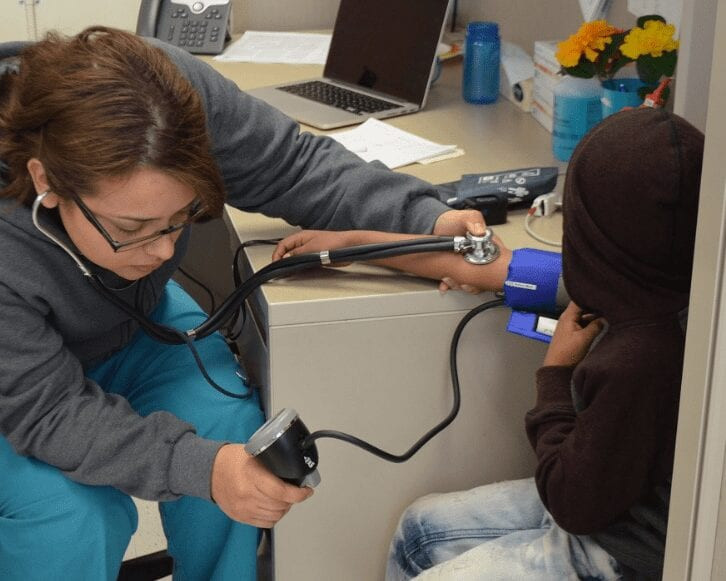PAVE Clinic Makes Vaccination Easier So Kids Can Start School
For families who are new to this country, have limited incomes, or rely on public transportation, getting their kids properly vaccinated for school can be a real challenge. Lack of information is probably the biggest barrier: Many parents don’t know which vaccines their kids need or where to go to get them.
In Virginia, students must bring documentation of age-appropriate immunization status before starting school. Without that documentation, they can’t enroll.
Fairfax County Public Schools; NOVA Scripts Central, Northern Virginia’s only nonprofit pharmacy; and George Mason University’s Masons and Partners (MAP) Clinic are exploring a way to keep that from happening, through a school-based pilot project called Providing Access to Vaccines for Everyone (PAVE).
This is the first effort of its kind in Virginia. Our goal is to create a model that will help school districts around the country implement their own school-based immunization programs.
The idea is to make vaccination easy and accessible while educating families on the importance of having up-to-date vaccinations. PAVE provides free immunizations at the school system’s Dunn Loring central registration site, where the MAP Clinic has been conducting free school physicals for kids since 2017.
The collaboration between the school system, NOVA Scripts Central, and the MAP Clinic helps parents coordinate registering their children for school with getting their physicals and immunizations done at the same time—reducing stress and hassle for parents.
This coordination of services is more challenging than you might suspect. Many families with children entering school come from different parts of the world, including countries in Africa, the Middle East, and Latin America. Not only do they speak different languages, but they often have incomplete medical records. And, depending on their country of origin, they may not have had access to some vaccines required for school in the United States. It’s important to figure out which shots kids have already received and which ones they still need. Otherwise, they could wind up getting over-vaccinated.
The PAVE clinic is staffed by a nurse practitioner and a pharmacist, with nurse practitioner, nursing, pharmacy, and health informatics students on rotation. In addition, PAVE has recruited a culturally diverse group of volunteer pharmacists and health care professionals to help engage families.

PAVE clinic team (Photo credit: NOVA Scripts Central)
Between April, when the clinic launched, and late August, 132 kids in kindergarten through 10th grade were immunized. On average, each student received five vaccines. PAVE provides the first shot in the series for all pediatric vaccines recommended by the Centers for Disease Control and Prevention, including vaccines for pneumonia; hepatitis; diphtheria, tetanus, and pertussis; and mumps, measles, and rubella.
We enter the immunization records into the state immunization registry system and provide parents with a copy of the documentation. Once students have documentation of their first shots, they can register for school. For follow-up shots, PAVE refers families to one of the public health department clinics.
Getting kids vaccinated is only half the equation. The other crucial half is education, so that families understand what vaccines do for their children, why they need to keep their vaccines up to date, and which vaccines are required. We are developing an “immunization passport” in multiple languages to inform parents about vaccines.
We’re also developing educational workshops for parent liaisons who work with the school system so that they can disseminate information about vaccines to families in the community and answer their questions.
We’ve learned a lot from the pilot already. It was critical, at the outset, to have strong support from the school system and other partners in the community. Planning, coordination, and communication are essential. For example, some vaccines must be spaced out because they can’t be administered together. But getting parents to come back to complete their kids’ shots is challenging. We also have to coordinate vaccinations with tuberculosis screening because you can’t screen a child for TB if she’s already received certain vaccines.
In addition, we’ve learned some techniques for keeping kids calm while they’re getting vaccinated. When you’re administering five shots to a young child, that’s a challenge. We have a chest of toys to distract the kids and a little pain-blocking device called Buzzy that has been surprisingly successful.
The state has provided vaccines for the program, at a value of nearly $105,000 so far. Other than that, the program has had no outside support. The partners all believe in the value of PAVE, so we’ve been donating staff time and other resources to do the pilot. However, we will need financial support to sustain and expand PAVE after the pilot ends in December.
Since launching the pilot, we’ve heard from school districts in Alexandria, Prince Williams County, and even other parts of country, expressing interest in what we’re doing and how. No one, it seems, has figured out how to jump through all the hoops involved in getting kids vaccinated. We are creating a toolkit based on our experience with PAVE to help other school districts start their own immunization clinics.
In the end, it’s all about making sure kids can go to school while protecting their health. For many families, that’s a struggle. The least we can do is lower some of the barriers and make it easier for parents.
For more information on the PAVE clinic, visit http://novascriptscentral.org/pave/.
NOVA Scripts Central is a grantee of the Northern Virginia Health Foundation.

